Archipelago Cinema by Ole Scheeren, Yao Noi
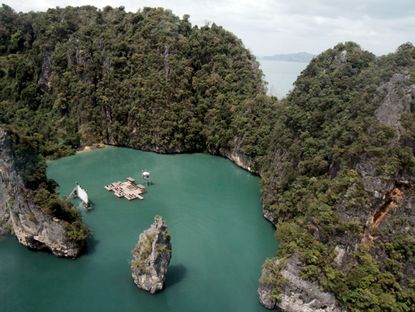
Held in March this year, the inaugural Film on the Rocks festival, curated by Thai filmmaker and artist Apichatpong Weerasethakul and British actress Tilda Swinton - and held on the Thai island of Yao Noi - is surely a contender for 'film festival with the most stunning backdrop'. The films were shown on a floating cinema structure designed by architect Ole Scheeren, the man behind the iconic CCTV building in Beijing during his OMA days.
As with many great ideas, the seed for the Archipelago Cinema and the Film on the Rocks festival was planted over a cocktail. Lawyer-trained fashion designer and writer Chomwan Weeraworawit, who co-founded the festival, came up with the idea in a little bar in Bangkok, with Vincent Gillet - then CMO of Six Senses. 'We had an idea about doing something centred around projecting films on the lime stone rocks that rise from the ocean and pierce the sky near Yao Noi Island, where the Six Senses Yao Noi is located,' recalls Weeraworawit. 'It was a fantasy.'
At the time it might have felt like one, but soon real options were explored and a plan started taking shape for a film festival set in the island’s spectacular natural landscape. Weerasethakul and Swinton took on the role of curators, while Nat Sarasas, the owner of the Six Senses Yao Noi, joined the team and became a driving force in the venture. Finally, Scheeren was invited to contribute.
Scheeren had previously worked in the country during the 1999 Cities on the Move exhibition in Bangkok and impressed the festival organisers with his imagination and skill. His previous work for the Marfa Drive-In theatre in the desert of Texas in 2006 worked as an added bonus for the Yao Noi job.
'I was invited to take part, but my role was completely open,' says Scheeren. 'Being an architect, working on an environment for the screenings felt like an obvious way to be involved. And after seeing the location, I decided I wanted to put people on water.'
Created by local craftsmen, using regional building techniques (the floating parts are based on the rafts traditionally used for lobster fishing around the island), the structure incorporates recycled materials. Says Scheeren: 'The inspiration came from the landscape. Then we looked at local methods and references to work out the best way to build the structure.'
The event is now over, but the structure might be appearing among the gondolas this summer. While Archipelago Cinema has been dismantled and parts of it have gone back to the local community, according to the architect’s original intent, it is a modular structure that can be reassembled and built in different configurations. The only clue Scheeren will give us is: 'There are plans about the structure to potentially travelling as far as Europe.'
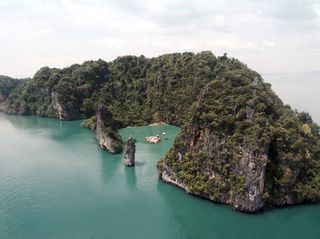
Created by local craftsmen, using regional building techniques (the floating parts are based on the rafts traditionally used for lobster fishing around the island), the structure incorporated recycled materials.
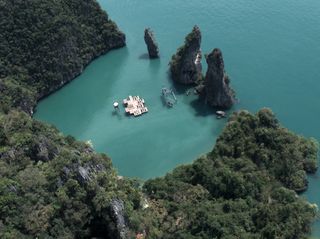
The cinema was protected from the elements by a circular bay.
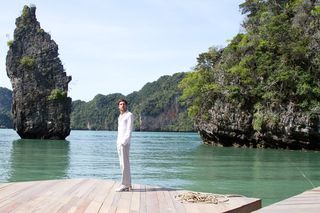
Says Scheeren: 'The inspiration came from the landscape. Then we looked at local methods and references to work out the best way to build the structure'.
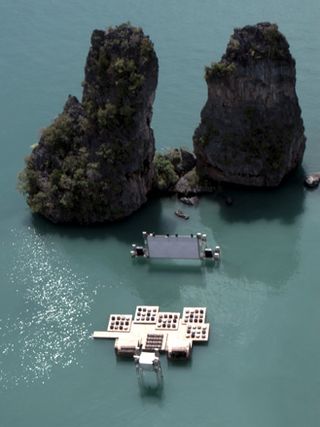
The cinema featured a projector tower and screen by lighting specialist Poon Limpapun.
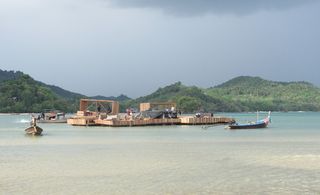
While Archipelago Cinema has now been dismantled and parts of it have gone back to the local community according to the architect’s original intent, it is a modular structure that can be reassembled and built in different configurations.
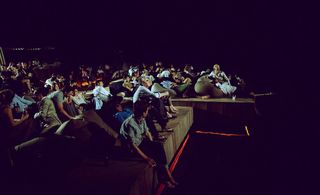
The inaugural Film on the Rocks Yao Noi festival showed films over four days and three nights.
Wallpaper* Newsletter
Receive our daily digest of inspiration, escapism and design stories from around the world direct to your inbox
Ellie Stathaki is the Architecture & Environment Director at Wallpaper*. She trained as an architect at the Aristotle University of Thessaloniki in Greece and studied architectural history at the Bartlett in London. Now an established journalist, she has been a member of the Wallpaper* team since 2006, visiting buildings across the globe and interviewing leading architects such as Tadao Ando and Rem Koolhaas. Ellie has also taken part in judging panels, moderated events, curated shows and contributed in books, such as The Contemporary House (Thames & Hudson, 2018), Glenn Sestig Architecture Diary (2020) and House London (2022).
-
 Pininfarina Battista Reversario is a new one-off electric hypercar
Pininfarina Battista Reversario is a new one-off electric hypercarThe all-electric Pininfarina Battista Reversario is joining its aesthetic inverse in an ultra-select car collector’s garage. We take a look at a car built to a very precise order
By Jonathan Bell Published
-
 Fernando Jorge’s fluid diamond earrings show his curve appeal
Fernando Jorge’s fluid diamond earrings show his curve appealDiscover Brazilian jewellery designer Fernando Jorge's snake-like silhouettes and graphic shapes
By Hannah Silver Published
-
 Abreham Brioschi debuts Ethiopia-inspired rugs for Nodus
Abreham Brioschi debuts Ethiopia-inspired rugs for NodusAbreham Brioschi teams up with luxury rug experts Nodus to translate visions from his heritage into a tactile reality
By Ifeoluwa Adedeji Published
-
 Ole Scheeren’s architecture rewrites the rulebook
Ole Scheeren’s architecture rewrites the rulebookOle Scheeren’s architecture spans from the cinematic to the sustainable and the geometrically astounding. Deyan Sudjic, director emeritus of the London Design Museum, explores an architectural rule-breaker
By Deyan Sudjic Published
-
 The Standard Bangkok and The Standard Hua Hin bring pioneering hospitality to Thailand
The Standard Bangkok and The Standard Hua Hin bring pioneering hospitality to ThailandThe Standard Bangkok, in Ole Scheeren’s Mahanakhon tower, and The Standard Hua Hin, designed by Onion, bring the global hospitality brand to Thailand
By Shawn Adams Published
-
 ‘Ole Scheeren: Spaces of Life’ celebrates ‘form follows fiction’ in architecture
‘Ole Scheeren: Spaces of Life’ celebrates ‘form follows fiction’ in architecture‘Ole Scheeren: Spaces of Life’, a comprehensive look into the work of the German architect, opens at ZKM | Center for Art and Media Karlsruhe
By Ellie Stathaki Published
-
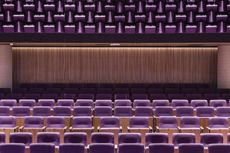 Watch Oscar-worthy movies in fine contemporary cinema design
Watch Oscar-worthy movies in fine contemporary cinema designAhead of the Oscars 2022 ceremony this weekend, we tour some of the finest cinema designs around the world in celebration of amazing movie theatre architecture
By Ellie Stathaki Last updated
-
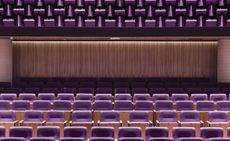 Cinema architecture redefined in Teatro Vivo in São Paulo
Cinema architecture redefined in Teatro Vivo in São PauloTeatro Vivo is a cinema that brings a bit of magic to a central São Paulo mixed-use building
By Ellie Stathaki Last updated
-
 Interiors for Ole Scheeren’s Fifteen Fifteen in Vancouver revealed
Interiors for Ole Scheeren’s Fifteen Fifteen in Vancouver revealedFifteen Fifteen, a high-end, high-rise residential development by Ole Scheeren in Vancouver, Canada, reveals its apartment interiors ahead of sales launch
By Ellie Stathaki Last updated
-
 Scale meets ambition in Vancouver’s architectural future
Scale meets ambition in Vancouver’s architectural futureThe latest instalment in our ‘Letter from...' series journeys through the urban future of Canada's ‘most liveable city’
By Hadani Ditmars Published
-
 Büro Ole Scheeren’s MahaNakhon tower in Bangkok launches with floating glass sky deck
Büro Ole Scheeren’s MahaNakhon tower in Bangkok launches with floating glass sky deckBy Harriet Thorpe Last updated